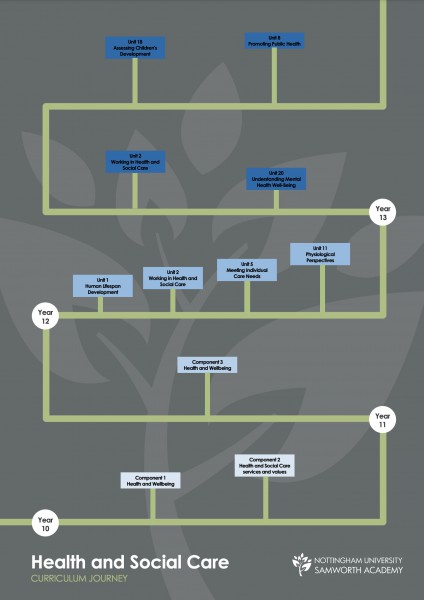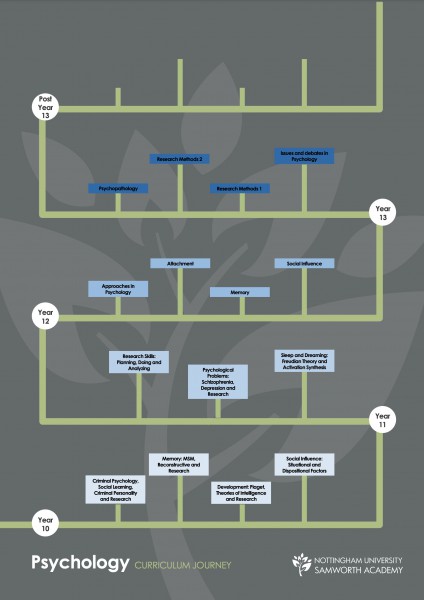Curriculum Intent
Health and Social Care
“There is no greater joy nor greater reward than to make a fundamental difference in someone’s life.”
— Mary Rose McGeady
Purpose
Health and Social Care equips our students to discover the impact of positive and negative human development and to critically analyse how these factors affect our day to day lives. Health and Social Care enables students to explore areas that influence how we develop throughout life stages and in turn raise expectations of how we can live successful and healthy lives now and in our future.
Health and Social care enables all students to learn about different health conditions which can effect individuals. Students will then be encouraged to develop Health Plans to improve health and wellbeing along with overcoming any barriers.
Understanding of the different Care Values within Health and Social Care are developed to enable students to learn how to work within any health or social environment and why each one is important. Students will also be encouraged to do further research into the different settings and roles within those settings relating them to health conditions.
Health and Social Care promotes opportunities for students to draw from case studies and opportunities to undertake research to compliment learning and create skills that will be used throughout their lives. These skills encourage students to think outside typical teenage ego-centrism and begin to challenge the way they perceive the world we live in. Furthermore, highlighting how human relationships, physical environments and socioeconomic status may influence how they develop.
Through investigation of health and well-being and how our lifestyle choices effect how healthy we are, students access different resources and external agency advice and guidance that encourages them to talk about areas and raise awareness of signs and symptoms of: abuse, addiction, illness and mental health.
Curriculum features
Development of key skills that prove your aptitude in health and social care such as interpreting data to assess an individual’s health.
Process that underpins effective ways of working in health and social care, such as designing a plan to improve an individual’s health and wellbeing.
Attitudes that are considered most important in health and social care, including the care values that are vitally important in the sector, and the opportunity to practise applying them.
Knowledge that underpins effective use of skills, process and attitudes in the sector such as human growth and development, health and social care services, and factors affecting people’s health and wellbeing.
The development of core knowledge and understanding of human growth and development, how people deal with major life events, health and social care services.
The development and application of skills such as: practical demonstration of care values, together with the ability to reflect on own performance.
Reflective practice through the development of skills and techniques that allow learners to respond to feedback and identify areas for improvement using relevant presentation techniques.
Enrichment
We will enrich our curriculum by enabling students to experience the subject out of lessons to expand knowledge, including work experience opportunities, developing partnerships with external providers that extend opportunities for learning; Giving a deeper understanding of links between knowledge learnt and vocational context.
Curriculum Journey
Psychology
“Who looks outside, dreams; who looks inside, awakes. Don't compare yourself with other people; compare yourself with who you were yesterday. If you change the way you look at things, the things you look at change.”
Purpose
Psychology aims to change, influence, or control behaviour to make positive, constructive, meaningful, and lasting changes in people's lives and to influence their behaviour for the better. At NUSA, our ultimate aim is to produce psychologists of the future who are going to positively influence the community around them as well. Students in psychology must be curious learners and know how their work as aspiring psychologists is applicable to the wider world. Our students will enjoy challenge and will show thought and resilience when faced with psychological questions. A good psychologist has a clear understanding of the core concepts of psychology (Social influence; Language, thought and communication; Brain and neuropsychology; Psychological problems) and will be able to use this knowledge to apply it to a wide range of conditions, both practically and written. Our curriculum promotes resilience, independence and organisation. Our learners are scientifically literate and are able to articulate their knowledge and thinking in many different ways. We are keen to make outstanding scientists who are able to complete an experiment from beginning to end. Students in psychology will be able to plan practical experiments and adjust where necessary. Our teachers will develop our students’ knowledge and skill-base using a wide range of research methods, and will be able to select the correct method for the relevant research questions. Our curriculum encourages and facilitates further studies or potential careers in the subject, whilst empowering students to have a greater appreciation and awareness of Psychology related issues in the world around them.
Curriculum features
The Psychology curriculum will make a profound, positive impact on every student's academic, moral, and social outcomes. Psychology contributes to the moral education of students as it involves students discussing values, attitudes and beliefs relating to a range of ethical, social, and controversial issues (E.g., culture bias, ethical costs of conducting research, animal research, and gender bias).
Psychology is a multifaceted scientific subject; therefore, the curriculum is a channel for interdisciplinary learning by supporting learners to make connections between their prior and current study of mathematics, English and the sciences, namely biology and chemistry. The psychology department follows the OCR specification which covers topics such as human memory, psychopathology, social influence, forensic psychology, and stress. Research methods and data handling techniques used by psychologists are also a core focus. The broad range of topics taught in psychology such as research methods, biopsychology, conceptual and historical issues in psychology allow students to gain well-rounded knowledge in order to consider different pathways for the future. The curriculum content covered in A Level Psychology serves as a valuable basis for higher education courses such as psychology; neuroscience; law; business; nursing and can lead to careers in the health, education, and research sectors to name a few.
Enrichment
Throughout their learning journey, students will have the opportunity to develop literacy, mathematical and science-based knowledge and skills, the knowledge acquired in GCSEs will be highly relevant to studying Psychology. Students will learn how to pay attention to detail, solve problems, analyse beyond face value, think ‘out of the box’. The skills learnt will enable students to enter the world as a skilled, perceptive and adaptive member of society.


